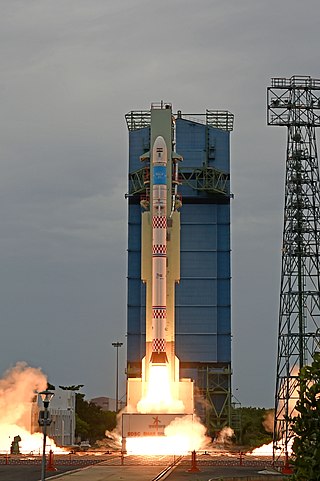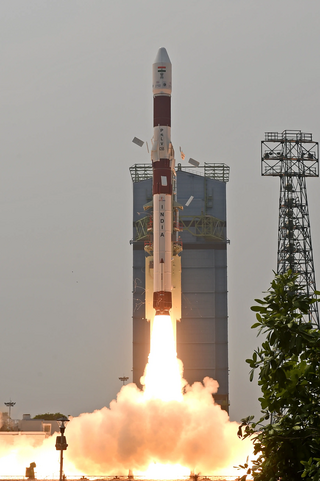
The Polar Satellite Launch Vehicle (PSLV) is an expendable medium-lift launch vehicle designed and operated by the Indian Space Research Organisation (ISRO). It was developed to allow India to launch its Indian Remote Sensing (IRS) satellites into Sun-synchronous orbits, a service that was, until the advent of the PSLV in 1993, only commercially available from Russia. PSLV can also launch small size satellites into Geostationary Transfer Orbit (GTO).

Geosynchronous Satellite Launch Vehicle (GSLV) is a class of expendable launch systems operated by the Indian Space Research Organisation (ISRO). GSLV has been used in fifteen launches since 2001.

Satish Dhawan Space Centre – SDSC, is the primary spaceport of the Indian Space Research Organisation (ISRO), located in Sriharikota, Andhra Pradesh.
PSLV-C34 was the 36th mission of the PSLV program and 14th mission of PSLV in XL configuration. The PSLV-C34 successfully carried and deployed 20 satellites in the Sun-synchronous orbit. With a launch mass of 320,000 kilograms (710,000 lb) and payload mass of 1,288 kilograms (2,840 lb), the C34 set a new record of deploying the maximum number of satellites by Indian Space Research Organisation in a single mission. The PSLV-C34 carried One Cartosat-2 satellite, SathyabamaSat, Swayam & 17 other satellites from United States, Canada, Germany & Indonesia.
PSLV-C35 was the successful mission of the Polar Satellite Launch Vehicle program which set eight satellites in space. It was launched on 26 September 2016 by Indian Space Research Organisation (ISRO) from the Satish Dhawan Space Centre at Sriharikota.
PSLV-C2 was the second operational launch and overall fifth mission of the Polar Satellite Launch Vehicle (PSLV) program. This launch was also the forty-third launch by Indian Space Research Organisation (ISRO) since its first mission on 1 January 1962. The vehicle carried three satellites which were deployed in the Sun-synchronous low Earth orbit. The vehicle carried India's first remote sensing satellite Oceansat-1 (IRS-P4) as the main payload. It also carried South Korean satellite KITSAT-3 and German satellite DLR-Tubsat as auxiliary payloads. PSLV-C2 was the first Indian Expendable launch vehicle to carry and deploy more than one satellite in a mission. This was also India's and ISRO's first commercial spaceflight where South Korea and Germany each paid US$1.0 million to ISRO for launching their satellites.
PSLV-C3 was the third operational launch and overall sixth mission of the PSLV program. This launch was also the forty-sixth launch by Indian Space Research Organisation since its first mission on 1 January 1962. The vehicle carried three satellites which were deployed in the Sun-synchronous Low Earth orbit. The vehicle carried Technology Experiment Satellite, BIRD and PROBA. This was India's and ISRO's second commercial spaceflight. PSLV-C3 was launched at 10:23 a.m. IST on 22 October 2001 from Satish Dhawan Space Centre.
PSLV-C5 was the fifth operational launch and overall eighth mission of the Polar Satellite Launch Vehicle program. This launch was also the fifty-second launch by the Indian Space Research Organisation (IRSO) since its first mission on 1 January 1962. The vehicle carried and injected India's remote sensing satellite Resourcesat-1 into a Sun-synchronous orbit; this was the heaviest and most sophisticated satellite built by IRSO through 2003. PSLV-C5 was launched at 04:52 hours Coordinated Universal Time on 17 October 2003 from Satish Dhawan Space Centre.

The Small Satellite Launch Vehicle (SSLV) is a small-lift launch vehicle developed by ISRO with payload capacity to deliver 500 kg (1,100 lb) to low Earth orbit or 300 kg (660 lb) to Sun-synchronous orbit for launching small satellites, with the capability to support multiple orbital drop-offs. SSLV is made keeping low cost, low turnaround time in mind with launch-on-demand flexibility under minimal infrastructure requirements.

PSLV-C42 was the 44th mission of the Indian Polar Satellite Launch Vehicle (PSLV) program and its 12th mission in the Core Alone (CA) configuration. PSLV-C42 successfully carried and deployed 2 Earth observation satellites in Sun-synchronous orbits at an altitude of 588 kilometres (365 mi). It was launched on 16 September 2018 by the Indian Space Research Organisation (ISRO) from the first launch pad of the Satish Dhawan Space Centre at Sriharikota, Andhra Pradesh. The two international satellites were launched as part of a commercial arrangement between Surrey Satellite Technology Limited (SSTL) and ISRO's commercial arm Antrix Corporation Limited, run under the auspices of the Indian Government's Department of Space.

The PSLV-C44 was the 46th mission of the Indian Polar Satellite Launch Vehicle (PSLV) program. It was the first flight of PSLV-DL, having 2 strap-on boosters and placed a primary payload Microsat-R and a secondary payload of Kalamsat V2 in Sun-synchronous orbits.

The PSLV-C45 is the 47th mission of the Indian Polar Satellite Launch Vehicle (PSLV) program. The Polar Satellite Launch Vehicle (PSLV)-C45 was launched on 1 April 2019 with a payload of 29 satellites, including one for electronic intelligence, along with 28 customer satellites from other countries.
EOS-01 is an X-band, synthetic-aperture radar (SAR) based all weather Earth imaging satellite built by the Indian Space Research Organisation (ISRO) for tasks pertaining to forestry, agricultural and disaster management. It is a part of India's RISAT series of SAR imaging spacecraft and would be third satellite in the series including RISAT-2B, RISAT-2BR1 with 120° phasing. EOS-01 has been developed at the cost of roughly ₹125 crore.

The PSLV-C51 is the 53rd mission of the Indian Polar Satellite Launch Vehicle (PSLV) program. The Polar Satellite Launch Vehicle (PSLV)-C51 was launched at 04:54 (UTC) / 10:24 (IST) on 28 February 2021 with the main payload from Brazil, INPE's Amazônia-1 and 18 other ride-sharing small satellites.

The PSLV-C52 is the 54th mission of the Indian Polar Satellite Launch Vehicle (PSLV) program. The Polar Satellite Launch Vehicle (PSLV)-C52 was launched at 05:59 (IST) on 14 February 2022 with the RISAT-1A(EOS-04), INSPIREsat, INS-2TD as its main payload.

The PSLV-C54 was the 56th mission of the Indian Space Research Organisation's Polar Satellite Launch Vehicle (PSLV). It was launched on 26 November 2022 with the Oceansat-3 satellite and Thybolt nanosatellites of Dhruva Space from Satish Dhawan Space Centre, Sriharikota, Andhra Pradesh, India.

The PSLV-C55 was the 57th mission of Indian Space Research Organisation's Polar Satellite Launch Vehicle (PSLV) and the 16th flight of the PSLV-CA variant.

The PSLV-C56 was the 58th mission of Indian Space Research Organisation's Polar Satellite Launch Vehicle (PSLV) and the 17th flight of the PSLV-CA variant, and was launched from Satish Dhawan Space Centre First Launch Pad (FLP).

The PSLV C-58 was the 60th flight of the Indian Space Research Organisation's Polar Satellite launch Vehicle. It carried the XPoSAT mission along with rideshare payloads.













